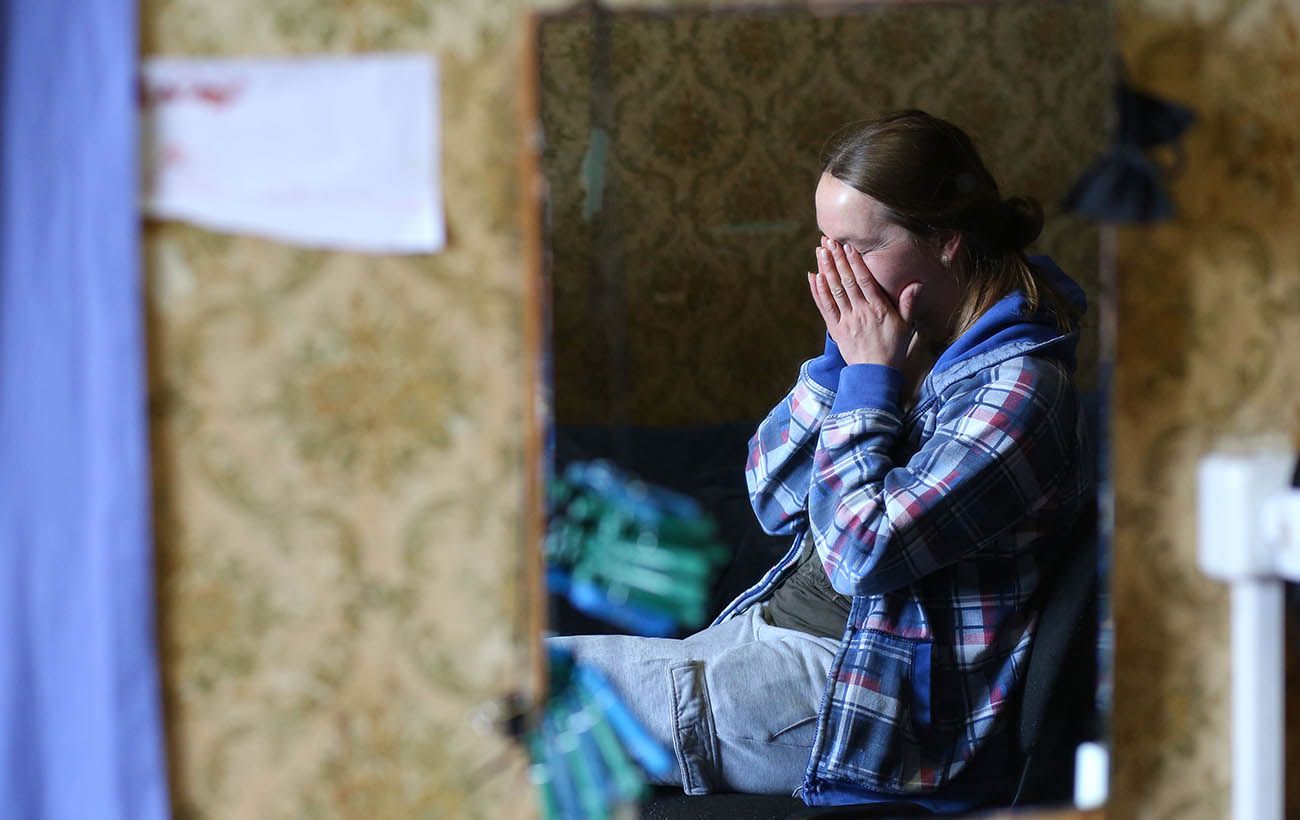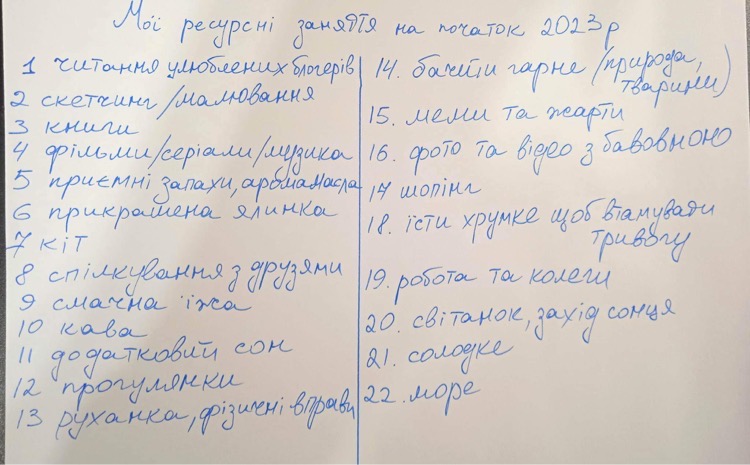
What is the problem?
russia's war in Ukraine, which has been going on for almost a year, is exhausting Ukrainians materially, physically, and psychologically. The loss of the usual way of life, and many household problems that we did not face in the peaceful times, take away strength and "derail." Every day, even in the deep rear, we learn about shelling, wounded and dead people, destroyed cities, and violence by the occupiers. Let alone those who are at the very epicenter of events — military medics, volunteers, our defenders.
Constant stress eats up internal resources, and the urgency of the question of how to replenish it becomes more acute every day of the war.
What is the solution?
Where to find and how to fix those magical "buttons" that can turn on the "second wind"? How to overcome the feeling of apathy and extreme fatigue?
If the words that we are strong and patient start to annoy you, but you do not feel that way, then it is time to learn to restore your resource state.
How does it work?
What is a resource state?
A resource is something that is used to achieve goals. Human resources are of the following types:
- Physical;
- Emotional;
- Intellectual;
- Informational;
- Time, relationships with other people, and their physical and emotional support.
The state of "I am in the resource" is the presence of strength and energy for the effective resolution of the issues and achievement of goals. On the physical level, resourcefulness usually occurs after rest, a long sleep, or when we feel healthy. At the psychological level, the resource state is a good mood, self-confidence, and the wish to realize one's desires and plans.
Where does the resource disappear?

Enemies of the resource state:
- critique from other people
- excessive self-criticism,
- conflicts, including hidden resentments, claims, unjustified expectations,
- a lot of disturbing news, angry comments on the Internet,
- communication with negative people,
- bad habits,
- lack of regime and improper nutrition.
According to experts, what a person pays attention to is the basis of their life. If the focus is on negative emotions and failures, then there is simply no room for good in it.
So, first of all, you need to figure out what is taking up the most resources from your current focus. And having figured it out, try to shift the focus.
Thus, when solving a problem, the focus of attention can be directed from emotions to researching the problem and finding its solution. It is also important to talk about emotions; you can do it even to yourself — mentally or by writing them down on paper or talking about them to a person you trust, if possible — to a specialist. Speaking of emotions, we do not run from them and do not try to get rid of them, but accept them. It is important.
When the resource goes to rethinking obsessive thoughts, it is also important not to run away from them. Try to think them through to the end, do not resist them, but come up with the final scenario. Then the brain will perceive this task as completed, and there will be no point in returning to the same thing.
Reading the news on the Internet and the chaos "knocks you out"? To keep abreast of events, subscribe to several official channels with no emotional component but only facts. Monitor your info space — monitor only those media resources, information, and tone you trust (for example, Rubryka).
Did you evacuate abroad/go to a neighboring region/remain under shelling, and others condemn you for it? Stop communicating and making excuses to those who are "not in the same boat" as you. You had a reason to act this way and not otherwise; you are not an exception but one of many who did the same as you did.
If you are a volunteer and hear sad stories from people daily, try to focus on how their faces light up when they receive help and hear the gratitude and your sincere words of support. You are doing an important thing; your work is saving someone's life.
How to "fix" your resource state?

In periods of crisis, trauma, and war, we often feel defenseless and weak; our inner child wants to freeze and hide their head under an imaginary blanket from the endless problems of wartime because it seems that these horrors will never end.
However, we are already adults, and all psychologists are united in emphasizing: to preserve mental health and work capacity, a person must look for methods of decompression, relaxation, and joy precisely in challenging times.
The challenges of war require a lot of strength, which is why it is so important to find your own creative approach to this reality, psychologist Anna Tarova says. Now in open access, you can find many resource exercises or classes that help you orient yourself and choose the ones that are right for you. The process itself can be an exciting exploration as you experiment, try and discover what restores you and what doesn't.
The expert also suggests determining what helps you to be filled with energy and making a list of such things and actions. The psychologist emphasizes that when you start making your list, the bigger and longer it is, the better. It is important that these are different activities (something creative, something physical, something simple, or even passive, such as scrolling through aesthetic pictures on Pinterest or eating something tasty). Creativity, humor, play, and something useful for the body — are the main directions that fill and add joy and strength.
What exactly to put on the list, choose based on what is available to you now. It will be helpful to remember what you liked to do in childhood or youth. Long-forgotten hobbies, games, and entertainment can help you now.
Anna Tarova shared with Rubryka one of her own lists, which she periodically compiles for herself. Among the psychologist's own January resources are communication with colleagues, friends, and her cat, music, TV shows, pleasant smells, Christmas trees, watching sunrises and sunsets, and collecting memes, photos, and videos with "cotton" (a joke that plays with the fact that Ukrainians ironically call explosions in russia or the occupied territory 'cotton' – bavovna — ed.) Even the item "eat crisps" made it to the list — the psychologist says that this helps her personally cope with anxiety.

Compiling such a list helps you understand yourself and not get confused in case you need to support yourself emotionally. If it is at hand, you can easily remember what gave you strength last time. Be prepared because some of the resource activities you find may only work once or for a couple of months and then stop working. That's okay; you'll have to look for something new again; it's an ongoing process.
What will be efficient besides lists? When you feel tired, do something opposite to what caused it. If you have been moving a lot — lie down to rest; if you have been sitting — move; if you have been at home — go outside for a walk (of course, if there is no threat of shelling or an air raid). On the street, try to look at familiar things around you as if you were seeing them for the first time. This is a game — as if you are a tourist in your yard, street, or city. Look around and find something nice or something surprising.
Even more useful solutions!
In addition, psychologist Anna Tarova advises to pay attention to three important things:
- The expression "A healthy mind is in a healthy body" is especially relevant during wartime because one of the most important resources is your physical well-being, which rests on three pillars — sleep, physical activity, and proper nutrition. The restoration of one's own resources should be started precisely with the physical state — it is the basis of everything. And after that, you must take care of your psychological state: the right self-adjustment will increase your strength, and the wrong one will deprive you of them.
- Tiredness "from everything" can also be a sign of depression. If you have no energy, insomnia, loss of appetite, and can't do routine self-care things, and this condition lasts for 2 weeks or more, it can be dangerous. Contact a psychiatrist — you can do it anonymously and even online.
- And the third is safety: when you begin to implement your resource activities, be sure to consider the conditions in which you are, and pay attention to air raid sirens and recommendations of the State Emergency Service.
This material was created by the online media outlet Rubryka within the framework of the "Ukrainian Rapid Response Fund" program, implemented by IREX, with the support of the US State Department. The content is the sole responsibility of the Rubryka online media outlet and does not necessarily reflect the views of IREX or the US State Department.

Newsletter
Digest of the most interesting news: just about the main thing







